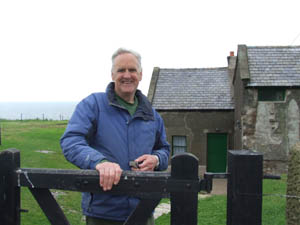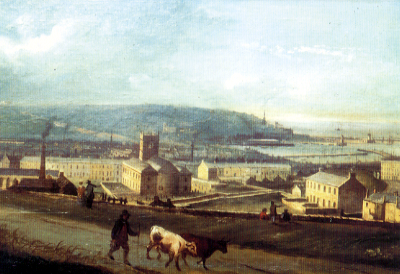|
I am convinced the ghost of Jonathan Swift is chortling
away in the draughty former Bowling Green Inn on its windy clifftop above
the Georgian port of Whitehaven. He will be amused at the strong willed
and outspoken character of 84 year old (in 2023) owner of the listed building,
Edward Caley Knowles. As well as being eccentric guardian of the former
inn that is now called Jonathan Swift House, Edward Knowles has still
not completed a 50 year long battle with the English legal system. Along
the way his stubborn belief that he has been wronged has led to victories
at the appeal court in London and less auspiciously a spell inside Durham
jail after he threatened to blow up the track beneath the Royal Mail train
to Scotland and similar death threats to the Board of British Railways.
It was in 1987 soon after the building gained Listed status that it passed
into Edward's ownership. The Listing records the building as built in
the late 17th century and one of the oldest houses in Whitehaven. The
view down on the port and rooftops of Whitehaven is 'Lilliputian' to many,
including no doubt the young Swift.
Whitehaven was at the time the busiest port outside London with its sailing
vessels among the first to make regular trade with Virginia and the infant
US states. George Washington's grandmother is buried in Whitehaven and
the fleet of ships dealing in both slaves and tobacco were frequently
Whitehaven based and skippered. But it was the fact that Whitehaven coal
pits supplied the coal for Dublin that generated the Swiftian links that
are a key part of our narrative.
Biographer and Swiftian expert Bruce Arnold confirms that the house was
visible in a print by Richard Parr 1668-1710 at the time the infant Swift
came to Whitehaven. Jonathan Swift himself described how he was abandoned
by his mother and taken by his wet nurse across the Irish Sea. Mr Arnold
states: "the nurse became so fond of the infant that she stole away
with him when she left for England to visit relations in Whitehaven and
he remained with her in circumstances which are quite extraordinary. Swift
tells us that she did this without permission, and moreover she seems
to have been encouraged to keep him there." Mr Arnold speculates:
"A more likely explanation is that the removal was a planned removal
of the child, whose continued presence in the city of his birth may have
been an embarrassment to his real father."
Edward expands on this: "I am sure John Ribton was Jonathan's true
father. There was hanky panky…he knew the widow and an arm around her
led to little Jonathan…Len Ribton worked for the Lowthers, the biggest
land and mine owners at Whitehaven. They would have known Mrs Swift through
working for the Lowthers in Ireland. Around 1639." Sadly historic
records of the infant Swift's stay in Whitehaven are scant and other experts
claim the child stayed in the town rather than at the clifftop inn.
Edward had been born in the Whitehaven workhouse 74 years ago. His CV
ranges from dodging River Orinoco headhunters while in the Merchant Navy,
work in the Whitehaven collieries and volunteer service as a staff officer
during the Cyprus troubles. Known around the town as an 'individual' Edward
has twice run as a Parliamentary candidate for UKIP, on the last occasion
netting 994 votes.
The nub of his four decades legal struggle was what he describes as a
provoked assault on the late Mr George Barton who Edward claims engineered
a row to take Edward's job. Edward admits he struck out but forever feels
wronged over the conviction. At one stage Edward's self image as the wronged
man led him to change his name by deed poll to Edward Christ.
He says: "All I did was follow railway instructions…but as a consequence
my life was destroyed…" He still claims the police and judiciary
failed him and so battles on.
When I gently point out that; "maybe after 44 years you should end
your legal battles?" He replies "Well John Quinn at Carlisle
had been claiming a police set-up for 46 years before he won justice.
And Betley got a posthumous pardon …"
Edward proudly shows me the court of appeal ruling from 2006 in which
this 1972 conviction for assault was quashed."
I was told by a senior Whitehaven detective of the time Edward threatened
to place a bomb on the railway this was taken so seriously Special Branch
flew in by helicopter. They landed at the town's rugby field to interview
and arrest Edward. This was understandable as around the time the IRA
were conducting operations on the UK mainland. Edward says he had already
been "into the cells a few times for disturbing the tranquility of
the court system". But this 12 months jail term for the bomb threat
does not seem to have caused him too much trauma as he says: "I was
something of a celebrity and because my battle had been against the British
Rail Board any mention of the railway on TV got a cheer from my fellow
inmates."
But the financial pressures have reached the point where Edward says he
is to sell the house next year. "Five or six years ago the National
Trust considered the property but decided not to proceed."
Dave Siddall
Originally written in August 2011.
|
|

